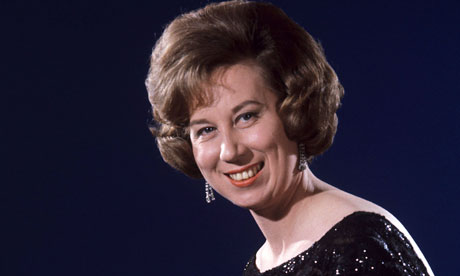
Patterson married trombonist Chris Barber and sang regularly with his band for 10 years.
Wide-eyed and diminutive, the singer Ottilie Patterson, who has died aged 79, challenged critical perceptions every time she sang the blues. Before her first appearance on the London traditional jazz scene in 1955, the idea of a demure white woman from Northern Ireland replicating the classic African-American blues style would have seemed ludicrous. But Patterson sang with a lusty clarity and innate grasp of the idiom that swept away any objections. A fellow blues enthusiast, the vocalist and commentator George Melly, likened her to Bessie Smith, while the US critic Leonard Feather spoke of her "conviction and authority". "I sing the blues because I find it so fulfilling," Patterson said, and it showed.
She was born in Comber, Co Down, the youngest of four children. Her father, Joseph, was Northern Irish and her mother, Julia Jegers, was Latvian. Both families were musical – a grandfather played the bagpipes – and Patterson took classical piano lessons from the age of nine. If she sang it was for her own amusement – although she did win a Carroll Levis talent contest in Belfast when she was 12 – and she kept any jazz ideas in abeyance until she began her art studies at Belfast College of Technology.
There, a fellow student named Derek Martin introduced her to recordings by Jelly Roll Morton, the boogie-woogie pianist Meade Lux Lewis and Smith, the greatest blues diva of them all, and she was smitten. She heard the trombonist "Wild" Al Watt playing If You See Me Coming at a student dance and was schooled in boogie piano by Martin. Fired up and ready for anything, Patterson then began to sing blues numbers with a band including Watt and Martin, later christened the Muskrat Ramblers, and also sang with Jimmy Compton's jazz band. "I'm still trying to work out whether I got hold of the blues or they got hold of me," she reflected later.
Patterson went to London on holiday in 1954 and met the singer Beryl Bryden, who took her to hear the cornetist Ken Colyer's band at a Soho gig. When she asked if she might sing with them, she was told to go away, and it was only when the pianist Johnny Parker and Patterson started an impromptu duet at the end of the evening that the musicians woke up, unpacked their instruments and joined in. Days later she linked up with the trombonist Chris Barber and sang with his band for the remainder of her holiday.
Back in Ireland and underwhelmed by her teaching job at Ballymena Technical College, she responded to a firm job offer from Barber (it came in a telegram) and made her debut with the band at the Royal Festival Hall in London on 9 January 1955. Audience reaction was ecstatic and Patterson went on to perform with Barber for the next 10 years, coping stoically with the many indignities imposed on a woman in a resolutely male-dominated world.
Her time with the band also coincided with the peak of the so-called "trad boom", and they toured non-stop, often playing 200 dates a year. She shared the stage with fellow vocalist Lonnie Donegan, starred on Barber's many recordings and made albums under her own name, including The Patterson Girl volumes one and two (1955 and 1956). She also occasionally played piano and contributed songs of her own, and in 1962 appeared in Dick Lester's movie It's Trad, Dad! She was thrilled to perform alongside such redoubtable US figures as the gospeller Sister Rosetta Tharpe and the bluesmen Sonny Terry, Brownie McGhee, Muddy Waters and Big Bill Broonzy, all of whom toured in Britain with Barber's band. If they thought her dedication to the blues was incongruous, they never let on, offering her nothing but encouragement and approval.
Buoyed up by the runaway success of their recording of Petite Fleur, a 1959 hit in both the UK and the US, the Barber band toured the States seven times during the Patterson era. The San Francisco Examiner pictured her as "the world's only Irish blues singer" and at the Washington jazz festival in 1962 the reaction of the largely black audience to Patterson's performance was so tumultuous that Duke Ellington's arrival on stage was delayed for fully 10 minutes.
In a career garlanded with highlights, Patterson cited the band's visit to the Smitty's Corner blues club in Chicago's South Side as her single most rewarding experience. After responding to an invitation to come up and sing with Muddy Waters's band, she heard one African-American lady patron call out, "Hey, lady, you sing real pretty. How come you sing like one of us?"
All too soon, Patterson's health began to fail and she stopped singing in the mid-1960s.
Although she returned to tour occasionally with Barber in the 1970s and in 1991, she later opted out of regular performance altogether, living quietly in St Albans before relocating to Ayr in Scotland, where she spent her final years in a care home.
Patterson was married to Barber from 1959 until their divorce in 1983.
• Anna-Ottilie Patterson, blues singer, born 31 January 1932; died 20 June 2011
No comments:
Post a Comment